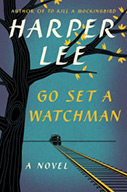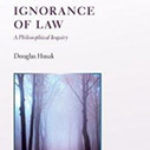Go Set a Watchman

Author: Harper Lee
Publisher: New York: Harper-Collins Publishers, 2015. 288 p.
Reviewer: Abbe Smith | September 2015
Much has been written about Harper Lee’s Go Set a Watchman, which was published with great fanfare this past July. Most of the coverage has been about the circumstances underlying the book’s publication—whether it was suddenly discovered when thought lost, whether Lee really wanted it released or was manipulated by her lawyer and publisher, whether the increasingly frail Lee could provide informed consent. Record-breaking prerelease sales and the book’s strong position on the New York Times bestseller list are both damning and vindicating, depending on your perspective.
I am among the skeptics as to whether Lee wanted this book published. My view is based on the 35th anniversary edition of To Kill a Mockingbird, the 1960 Pulitzer Prize-winning novel that Watchman is said to predate. When this special edition was released in 1995, it had the original jacket design but was emblazoned with a new gold band that boasted, “A New Foreword by the Author.” For the millions of readers who loved Mockingbird—including me—the prospect of a few more words from its reclusive author was thrilling. Since Mockingbird, Lee had written nothing else and had barely uttered a word to the public since the film version was released in 1962.
But the promised new foreword was nothing of the kind. Instead, the publisher reprinted part of a letter Lee had written two years before, rejecting a British publisher’s request for an introduction to the novel:
Please spare “Mockingbird” an Introduction. As a reader I loathe Introductions. To novels, I associate Introductions with long-gone authors and works that are being brought back into print after decades of interment. Although “Mockingbird” will be 33 this year, it has never been out of print and I am still alive, although very quiet. Introductions inhibit pleasure, they kill the joy of anticipation, they frustrate curiosity. The only good thing about Introductions is that in some cases they delay the close to come. “Mockingbird” still says what it has to say; it has managed to survive the years without preamble.
Those hundred words say a lot about how Lee felt about Mockingbird. She had said what she wanted to say in the book, was proud it had stood the test of time, and didn’t want to muck it up with more words. It seems to me that if she didn’t want to write a brief addendum to her celebrated book, she would hardly be inclined to publish a sequel.
That said about Watchman’s genesis, what should we make of the book—either as a follow-up to Mockingbird or on its own terms? And what should we make of Atticus Finch, heretofore the heroic criminal lawyer fighting to save the life of an innocent black man falsely accused of raping a white woman in the Depression-era South, but now, in Watchman, a member of a white “Citizens’ Council” who is desperate to keep blacks in their place and the NAACP out of Alabama?Must we conclude that Atticus is no longer worthy of our regard—and that the scores of criminal lawyers who named their children after him must now hang their heads in shame? What does the new book—and the old—say about criminal lawyers in general? If we consider Watchman a completely separate book, what should we make of it?
Before going further, let me reveal that I am something of an Atticus apologist. In 2011, I wrote an essay called “Defending Atticus Finch” in the journal Legal Ethics, in which I responded to several prominent critics of the Mockingbird Atticus: Hofstra University law professor Monroe Freedman, who was the first and most prophetic of the detractors, Northwestern law professor Steven Lubet, and New Yorker writer Malcolm Gladwell. In sum, Freedman assailed Atticus for having to be asked to represent Tom Robinson instead of volunteering, for not challenging Jim Crow in court or the larger community, and for making light of the Ku Klux Klan as a “political organization”; Lubet criticized Atticus for gender bias in his theory of defense and cross-examination of Mayella Ewell; and Gladwell called Atticus an accommodator of a systemic racism that persists today. In other words, Atticus was a racist and sexist.
I responded by urging context: Atticus reflected his time and place. I argued that there is no shame in being appointed to represent an indigent defendant rather than volunteering, that Atticus was not an activist but a criminal lawyer representing an individual charged with a capital offense, that he downplayed the Klan to his own frightened children who feared for their father’s safety, that the theory of defense—a version of consent—was the only viable defense and was based on fact, and that a certain amount of “accommodation” is unavoidable—and sometimes useful—for trial lawyers. I also acknowledged that Atticus is not perfect. That he prefers to see the best in people—even people with “blind spots” who do bad things (Mockingbird, 168)—feels familiar to me as a criminal lawyer, as does playing on peoples’ prejudices to zealously defend the accused rather than working to end all prejudice. I preferred to focus on Atticus’s excellent advocacy, his insistence upon due process over lawless mobs, and his literally putting himself between a lynch mob and his client. That Atticus might be flawed does not make him any less heroic to me.
And now comes Watchman, in which Atticus Finch is even more flawed. He attends the Citizens’ Council meeting (103-4) in the very courtroom where he defended Tom Robinson—successfully in Watchman, an interesting twist (109). He introduces a virulent white supremacist at the meeting (107-111). He justifies his participation in this group because blacks are “backward,” and “in their childhood as a people” (242, 246). He sounds an alarm about “Negroes by the carload in our schools and churches and theaters….” (245).
I appreciated that Harvard law professor Randall Kennedy began his review of Watchman in the Times with a nod to my friend and coauthor Monroe Freedman, who died this past February. The relatively subtle faults for which Freedman upbraided Atticus in Mockingbird become unambiguous in Watchman. (Randall Kennedy, “Harper Lee’s Go Set a Watchman,” N.Y. Times Book Review, Aug. 2, 2015, at BR8.) I acknowledge that I found this painful. Still, I prefer University of Chicago law professor Richard McAdams’s cool-headed take on Atticus as a lawyer who ably defended a falsely accused black man, but no “radical.” As McAdams writes:
Near the end of Mockingbird, after Atticus has stood up to a lynch mob and vigorously defended a black man charged with raping a white woman, his daughter Scout asks him an important question. Is he, as her classmate Cecil had claimed, a “Radical”? Scout narrates: “Atticus was so amused [that] I was rather annoyed, but he said he wasn’t laughing at me. He said ‘You tell Cecil that I’m about as radical as Cotton Tom Heflin.’” Who is Cotton Tom? James Thomas Heflin was the U.S. Senator from Alabama in the years shortly before the time of Mockingbird, who the Pulitzer-prize winning journalist Douglas Blackmon describes as “Alabama’s most flamboyant white supremacist”
(Richard H. McAdams, “Past Perfect,” The New Rambler, summer 2015, at http://newramblerreview.com/book-reviews/fiction-literature/past-perfect.)
McAdams says that, in contrast to the small handful of southern radicals who completely rejected Jim Crow’s racial caste system, Atticus was a typical southern white liberal in both books. He was “liberal” in the sense that he opposed lynching and other forms of violent white supremacy and was humane in his dealings with black people, if paternalistic. But, like other southern liberals, he did not oppose segregation, black disenfranchisement, or laws prohibiting interracial sex or marriage. McAdams is unsurprised that Atticus, not being a radical, was a racist. “Those who cannot remember the past are condemned to being shocked by the most ordinary things,” he writes.
This reminds me of something that recently happened to my mother. At a dinner party in her largely Jewish gated community in South Florida, she was seated next to a woman who was spouting all kinds of racist rubbish. My mother, an Illinois Democrat who reveres Barack Obama, remonstrated, “Please do not talk about African Americans that way. Do you like it when people talk about Jews that way?” The woman replied, “I’m from the South.” She did not elaborate further.
Of course, I do not mean to suggest that racism—whether overt or covert, the old Jim Crow or the New—is the sole province of American southerners. But Atticus is very much a Southern character.
Still, criminal lawyers—whether or not they named their progeny after Atticus (or Scout, for that matter, as it turns out that she is not as “color blind” as she believes when she complains about the Supreme Court in Brown v. Board of Education “tellin’ us what to do again” (239)), and allows Calpurnia to call her “ma’am” and “Miss Scout” (139) when she is only 12 years old)—should not disown Atticus or those who bear his name. Though he takes a criminal appointment in Watchman for all the wrong reasons—fear that the NAACP will take the case instead, with all this implied (149)—it is understood that he will represent his client well (159). Watchman does nothing to diminish Atticus’ exemplary effort on behalf of Tom Robinson. Notwithstanding his “distaste” for criminal law, Atticus took the case because Robinson was innocent and “he could not for the life of him let the black boy go to prison because of a half-hearted, court-appointed defense” (109). So he “took his career in his hands . . . and accomplished what was never before or afterwards done in Maycomb County: he won an acquittal for a colored boy on a rape charge” (109).
It is noteworthy that the criminal case Atticus agrees to take in Watchman is on behalf of a factually guilty black defendant. The accused, driving fast, ran over a drunken white man (147-48). Atticus, like a real defender, is willing to defend the guilty and innocent alike.
Atticus illustrates that you do not have to be a “true believer” to be an excellent criminal lawyer. But you do need to be able to “climb into [another person’s] skin and walk around in it” (Mockingbird,30), breathe life into the presumption of innocence, and hold the prosecution to its burden of proof, as he did in the Robinson case, whatever the verdict.
I think we owe it to Lee to consider Mockingbird on its own terms, and the same for Watchman. They are separate books. They were not written to be part of a series—Atticus and Scout revisited every 20 years, with a fantasy third book yet to come in which Scout joins the 1970’s women’s movement and comes out as a lesbian. Mockingbird is a nearly perfect novel, worthy of acclaim. Watchman has its merits—the writing is sometimes lyrical and there are some wonderful childhood stories (one in which Scout believes she is pregnant because a boy gave her a French kiss, another in which she wears falsies to a school dance)—but it reads more like a memoir about the young adult Harper Lee and her father A.C., based on what I know from Charles Shields’ excellent biography, Mockingbird (2007). It also has amateurish bits, overly long speeches, and characters that lack development or credibility (Scout’s boyfriend Hank, her Uncle Jack).
Still the question at the heart of Watchman—how to deal with someone you have loved and admired whom you discover to harbor ugly prejudices—is rich and universal. So is the related question of what it means to grow up, leave home, come to see the world differently, and then return home again. I can’t help but wish that Lee had had the opportunity to work with the same gifted editor on Watchman that she collaborated with on Mockingbird. It could have been another masterpiece.
Abbe Smith, Professor of Law, Director, Criminal Defense & Prisoner Advocacy Clinic, Co-Director, E. Barrett Prettyman Fellowship Program, Georgetown University Law Center


